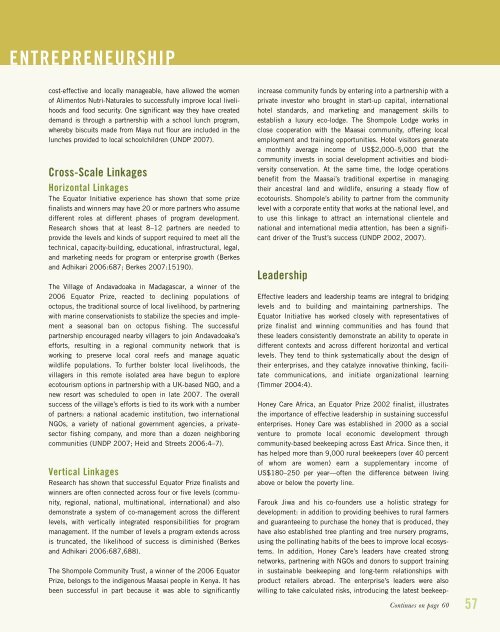Growing the Wealth of the Poor - World Resources Institute
Growing the Wealth of the Poor - World Resources Institute
Growing the Wealth of the Poor - World Resources Institute
Create successful ePaper yourself
Turn your PDF publications into a flip-book with our unique Google optimized e-Paper software.
ENTREPRENEURSHIPcost-effective and locally manageable, have allowed <strong>the</strong> women<strong>of</strong> Alimentos Nutri-Naturales to successfully improve local livelihoodsand food security. One significant way <strong>the</strong>y have createddemand is through a partnership with a school lunch program,whereby biscuits made from Maya nut flour are included in <strong>the</strong>lunches provided to local schoolchildren (UNDP 2007).Cross-Scale LinkagesHorizontal LinkagesThe Equator Initiative experience has shown that some prizefinalists and winners may have 20 or more partners who assumedifferent roles at different phases <strong>of</strong> program development.Research shows that at least 8–12 partners are needed toprovide <strong>the</strong> levels and kinds <strong>of</strong> support required to meet all <strong>the</strong>technical, capacity-building, educational, infrastructural, legal,and marketing needs for program or enterprise growth (Berkesand Adhikari 2006:687; Berkes 2007:15190).The Village <strong>of</strong> Andavadoaka in Madagascar, a winner <strong>of</strong> <strong>the</strong>2006 Equator Prize, reacted to declining populations <strong>of</strong>octopus, <strong>the</strong> traditional source <strong>of</strong> local livelihood, by partneringwith marine conservationists to stabilize <strong>the</strong> species and implementa seasonal ban on octopus fishing. The successfulpartnership encouraged nearby villagers to join Andavadoaka’sefforts, resulting in a regional community network that isworking to preserve local coral reefs and manage aquaticwildlife populations. To fur<strong>the</strong>r bolster local livelihoods, <strong>the</strong>villagers in this remote isolated area have begun to exploreecotourism options in partnership with a UK-based NGO, and anew resort was scheduled to open in late 2007. The overallsuccess <strong>of</strong> <strong>the</strong> village’s efforts is tied to its work with a number<strong>of</strong> partners: a national academic institution, two internationalNGOs, a variety <strong>of</strong> national government agencies, a privatesectorfishing company, and more than a dozen neighboringcommunities (UNDP 2007; Heid and Streets 2006:4–7).Vertical LinkagesResearch has shown that successful Equator Prize finalists andwinners are <strong>of</strong>ten connected across four or five levels (community,regional, national, multinational, international) and alsodemonstrate a system <strong>of</strong> co-management across <strong>the</strong> differentlevels, with vertically integrated responsibilities for programmanagement. If <strong>the</strong> number <strong>of</strong> levels a program extends acrossis truncated, <strong>the</strong> likelihood <strong>of</strong> success is diminished (Berkesand Adhikari 2006:687,688).The Shompole Community Trust, a winner <strong>of</strong> <strong>the</strong> 2006 EquatorPrize, belongs to <strong>the</strong> indigenous Maasai people in Kenya. It hasbeen successful in part because it was able to significantlyincrease community funds by entering into a partnership with aprivate investor who brought in start-up capital, internationalhotel standards, and marketing and management skills toestablish a luxury eco-lodge. The Shompole Lodge works inclose cooperation with <strong>the</strong> Maasai community, <strong>of</strong>fering localemployment and training opportunities. Hotel visitors generatea monthly average income <strong>of</strong> US$2,000–5,000 that <strong>the</strong>community invests in social development activities and biodiversityconservation. At <strong>the</strong> same time, <strong>the</strong> lodge operationsbenefit from <strong>the</strong> Maasai’s traditional expertise in managing<strong>the</strong>ir ancestral land and wildlife, ensuring a steady flow <strong>of</strong>ecotourists. Shompole’s ability to partner from <strong>the</strong> communitylevel with a corporate entity that works at <strong>the</strong> national level, andto use this linkage to attract an international clientele andnational and international media attention, has been a significantdriver <strong>of</strong> <strong>the</strong> Trust’s success (UNDP 2002, 2007).LeadershipEffective leaders and leadership teams are integral to bridginglevels and to building and maintaining partnerships. TheEquator Initiative has worked closely with representatives <strong>of</strong>prize finalist and winning communities and has found that<strong>the</strong>se leaders consistently demonstrate an ability to operate indifferent contexts and across different horizontal and verticallevels. They tend to think systematically about <strong>the</strong> design <strong>of</strong><strong>the</strong>ir enterprises, and <strong>the</strong>y catalyze innovative thinking, facilitatecommunications, and initiate organizational learning(Timmer 2004:4).Honey Care Africa, an Equator Prize 2002 finalist, illustrates<strong>the</strong> importance <strong>of</strong> effective leadership in sustaining successfulenterprises. Honey Care was established in 2000 as a socialventure to promote local economic development throughcommunity-based beekeeping across East Africa. Since <strong>the</strong>n, ithas helped more than 9,000 rural beekeepers (over 40 percent<strong>of</strong> whom are women) earn a supplementary income <strong>of</strong>US$180–250 per year—<strong>of</strong>ten <strong>the</strong> difference between livingabove or below <strong>the</strong> poverty line.Farouk Jiwa and his co-founders use a holistic strategy fordevelopment: in addition to providing beehives to rural farmersand guaranteeing to purchase <strong>the</strong> honey that is produced, <strong>the</strong>yhave also established tree planting and tree nursery programs,using <strong>the</strong> pollinating habits <strong>of</strong> <strong>the</strong> bees to improve local ecosystems.In addition, Honey Care’s leaders have created strongnetworks, partnering with NGOs and donors to support trainingin sustainable beekeeping and long-term relationships withproduct retailers abroad. The enterprise’s leaders were alsowilling to take calculated risks, introducing <strong>the</strong> latest beekeep-Continues on page 6057
















